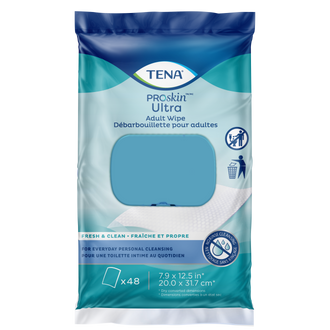Sep 30, 2024
After years of maintaining your weight, you notice your favorite jeans feel snug, just as menopausal symptoms begin. Coincidence? Not at all! Weight gain is a common and frustrating experience during menopause.1 But why does this happen? In this article, we'll explore the physiological changes that cause menopausal weight gain and share practical tips to help you manage your weight and stay healthy during this new chapter of your life.
How Common Is Weight Gain During Menopause?
Weight gain before and during menopause is something most women experience—you're not alone in this.2 Studies show that over 43% of women struggle with obesity during this time, with an average gain of 1.5 pounds a year.3 And yes, that extra weight often ends up around the abdomen, giving rise to the dreaded "menopause belly."2
So, what's causing this? It's a combination of hormonal shifts, a slowing metabolism, and disrupted sleep.2
Imagine this: you've spent half the night tossing, turning, sweating, and battling hot flashes. By morning, you're exhausted, and your stress hormones are sky-high. With nights like that, it's no surprise that finding the energy to exercise or make healthy food choices feels like an uphill battle.2
When Does The Weight Gain Stop?
One of the most common questions women have is, “When will this weight gain end?” While weight gain during menopause might seem permanent, the good news is, it doesn’t have to be.3 Most of the big changes happen during perimenopause, which can stretch out for up to 10 years before you hit menopause. Once you’re post menopause, things generally start to level off, provided you’re maintaining a healthy diet and staying active.2
What Causes Menopause Weight Gain?
Menopause-related weight gain is influenced by a variety of factors, ranging from hormonal shifts to lifestyle changes. Let’s break it down:
After years of maintaining your weight, you notice your favorite jeans feel snug, just as menopausal symptoms begin. Coincidence? Not at all! Weight gain is a common and frustrating experience during menopause.1 But why does this happen? In this article, we'll explore the physiological changes that cause menopausal weight gain and share practical tips to help you manage your weight and stay healthy during this new chapter of your life.
How Common Is Weight Gain During Menopause?
Weight gain before and during menopause is something most women experience—you're not alone in this.2 Studies show that over 43% of women struggle with obesity during this time, with an average gain of 1.5 pounds a year.3 And yes, that extra weight often ends up around the abdomen, giving rise to the dreaded "menopause belly."2
So, what's causing this? It's a combination of hormonal shifts, a slowing metabolism, and disrupted sleep.2
Imagine this: you've spent half the night tossing, turning, sweating, and battling hot flashes. By morning, you're exhausted, and your stress hormones are sky-high. With nights like that, it's no surprise that finding the energy to exercise or make healthy food choices feels like an uphill battle.2
When Does The Weight Gain Stop?
One of the most common questions women have is, “When will this weight gain end?” While weight gain during menopause might seem permanent, the good news is, it doesn’t have to be.3 Most of the big changes happen during perimenopause, which can stretch out for up to 10 years before you hit menopause. Once you’re post menopause, things generally start to level off, provided you’re maintaining a healthy diet and staying active.2
What Causes Menopause Weight Gain?
Menopause-related weight gain is influenced by a variety of factors, ranging from hormonal shifts to lifestyle changes. Let’s break it down:
Hormonal Changes and Metabolism
Declining estrogen levels play a role in weight gain.3 There is research that suggests estrogen plays a role in blocking the body’s hunger cues, which in turn, help you to eat less.3 These declining estrogen levels can also mean that your body starts to store more fat, particularly around the abdominal area.3
Aging, Muscle Loss and Slowing Metabolism
As you age, muscle mass gradually decreases, which directly impacts your metabolism, or the rate at which you burn calories.3 That’s because it takes more energy to maintain muscle than fat. Less muscle mass means fewer calories burned, leading to an increased likelihood of gaining weight — even if your eating habits remain the same.3
Genetic Factors
Genetics also play a role in menopause-related weight gain.1 If you’ve noticed that your parents or close relatives tend to carry extra weight around their midsection, you might find yourself dealing with the same thing.1
Sleep Deprivation and Weight Gain
Menopause often brings sleep disturbances, like night sweats and insomnia.2 Poor sleep can disrupt the hormones that regulate appetite, leading to increased hunger and cravings, which can contribute to weight gain.2
Reduced Physical Activity with Age
As we age, it’s common for physical activity levels to decrease. This reduction in movement further contributes to weight gain.1
Unhealthy Diet, Snacking, and Caloric Intake
During menopause, dietary habits can shift—whether due to stress, cravings, or changes to your sleeping patterns.2 Increased snacking, or the consumption of calorie-dense foods can lead to higher caloric intake, which, when combined with a slower metabolism, results in weight gain.
How to Prevent Menopause Weight Gain?
While gaining weight during menopause is common, it doesn’t have to be a given for you.3 Here are some ways you can prevent weight gain during menopause:
Increase Physical Activity and Strength Training
Regular exercise is key to reducing menopausal weight gain and also helps ease some of the bothersome symptoms of menopause, like hot flashes and mood swings.3 Building and maintaining muscle not only improves your metabolism but also supports your overall health.3
Aim for at least 150 minutes of moderate exercise each week, including strength workouts three times a week.>sup>3 It might sound like a lot, but it’s totally doable and worth it!
Read: 5 Ways to Lose Menopause Belly FatIncorporate Enjoyable Activities for Fitness
Exercise doesn’t have to be a chore. Find activities you love—whether it’s gardening, yoga, or other hobbies like hiking.1 When you enjoy what you’re doing, you’re more likely to stick with it and make it a regular part of your routine.
Prioritize Better Sleep
Regular physical activity can also work wonders for your sleep quality.1 The better you sleep, the easier it is to exercise more and manage your weight while juggling the ups and downs of menopause.1
Pay Attention to What You Eat
As your metabolism slows down with age, it’s important to adjust your caloric intake.1 Focus on choosing foods that are nutrient-dense and less processed to keep your diet balanced and your weight in check.1
Focus on Nutrition: Fruits, Vegetables, and Whole Grains
Load up on fruits, vegetables, and whole grains.1 These foods are not only packed with nutrients but also help keep you feeling full and satisfied, which supports both your overall health and weight management.
Explore Foods That Support Menopause
- Boost Your Menopause Weight Loss with These Foods
- Menopause Diet: What's Good, and What's Good to Avoid
Be Mindful of Your Sugar Intake
Watch out for added sugars, which can sneak into your diet and lead to weight gain.2 Check labels to avoid those hidden sugars in processed foods and beverages.2
Limit Alcohol Consumption
Cutting back on alcohol can help manage your weight and improve your sleep. Remember that alcohol has no nutritional value3— so moderation is key.
Managing Menopause Symptoms
Menopause can bring a variety of symptoms, from hot flashes and night sweats to weight gain and incontinence.4 It’s important to tackle these issues so you can continue to feel your best.
If incontinence is one of your concerns, you’re not alone. Fortunately, TENA’s range of products can provide reliable, discreet solutions to help manage this issue comfortably. The range includes incontinence liners, pads as well as underwear, each with different absorbency levels, so you can choose the product that’s just right for you.
Balancing lifestyle changes, like eating well and staying active, with practical solutions like TENA, can make a big difference in managing your symptoms and maintaining your quality of life.
References
1. MayoClinic. ‘The reality of menopause weight gain’. 8 July 2023. Accessed 21 August 2024. Available from: https://www.mayoclinic.org/healthy-lifestyle/womens-health/in-depth/menopause-weight-gain/art-20046058
2. Cleveland Clinic. ‘Menopause weight gain is normal- here’s how to combat it’. 3 July 2023. Accessed 21 August 2024. Available from: https://health.clevelandclinic.org/what-can-i-do-to-avoid-weight-gain-at-menopause
3. VeryWellHealth. ‘How to stop menopause weight gain’. 5 August 2024. Accessed 21 August 2024. Available from: https://www.verywellhealth.com/menopause-weight-gain-5184111
4. MayoClinic. ‘Menopause’. 7 August 2024. Accessed 21 August 2024. Available from: https://www.mayoclinic.org/diseases-conditions/menopause/symptoms-causes/syc-20353397







